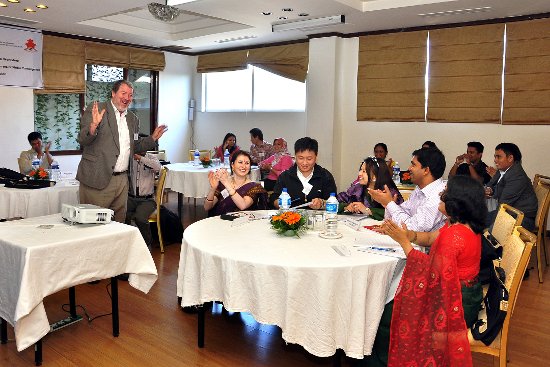Ms. Cecile Chavepayre, TV Artistic Director of CFI in France, encourages broadcasters to have a brand that is recognizable and consistent. “Moreover, they must brand strongly or speak loudly to differentiate the station from the rest and make consumer buy your products and services,” she said.
Ms. Cecile Chavepayre, TV Artistic Director of CFI in France, encourages broadcasters to have a brand that is recognizable and consistent. “Moreover, they must brand strongly or speak loudly to differentiate the station from the rest and make consumer buy your products and services,” she said.
A brand identity expert, Ms. Chavepayre spoke today at the AIBD/CFI/French Government Regional Workshop on TV Branding and Visual Identity in Bangkok. She is one of two consultants conducting the three-day workshop. The other consultant is Herve Michel, Director International Affairs at France Televisions.
Some 26 delegates from 13 countries, mostly from the marketing, sales and promotions units of private and public service broadcasting organizations are attending this workshop.
In her presentation, Ms Chavepayre identified the different elements of TV branding such as logo, headlines, credits, set design, auto promotion and sound. She said creating a brand should take into consideration values and context. Values, she said, refer to those that matter to a station; for a public service broadcaster it is the idea of sharing, of gathering people and being close to the audience; for the private station, it has to do with being entertaining, innovative and commercial.
“Context refers to whether or not you are a public service broadcaster or a private station, the history of the organization, your competitors, and the political regime you’re operating in,” she pointed out.
She cited two obstacles in building a successful brand, the lack of a clear strategy in which the station hardly knows its direction, and an organizational structure that does not adapt to the need to build a brand.
A major benefit of branding, she said, is enabling audiences exposed to so many things in the media environment to belong.
TV Needs a Recognizable, Consistent and Strong Brand
Ms. Cecile Chavepayre, TV Artistic Director of CFI in France, encourages broadcasters to have a brand that is recognizable and consistent. “Moreover, they must brand strongly or speak loudly to differentiate the station from the rest and make consumer buy your products and services,” she said.
Benefits of ISDBT
Mr. Masanori Kondo, Director of International Economic Affairs Division, Global ICT Strategy Bureau of the Ministry of Internal Affairs and Communications, Japan, has cited the numerous advantages of using the ISDBT standard in digital broadcasting that will enable TV companies and other stakeholders to fully maximize the benefits of the digital era.
Digital Transition should Ensure Harmonization
The complex transition from analogue to digital requires that countries move towards harmonization to maximize the benefit accruing from the digital dividend.
Summit Workshops on Digital Migration and TV Branding Begin
Two workshops, one on digital broadcasting, opportunities, business and challenges, and the other on TV branding and visual identity, start today, 26 May 2012, signaling the start of the pre-events of the Asia Media Summit in Bangkok.
Training of Young Journalists on Legal Awareness in an Era of Media Convergence
17 journalists participated at the one-week workshop on AIBD/IPDC-UNESCO Sub-Regional Workshop on “Training of Journalists on Legal Awareness in an Era of Media Convergence,” held from April 23-27 in Kathmandu, Nepal. The workshop was hosted by Nepal Television.
AIBD-MRTV4 Training Workshops
Through AIBD’s arrangement, Forever Group in Myanmar and MRTV-4 have received various trainings and workshops concerning with different broadcasting fields in the past few years and have trained skillful employees and trainees for the organization.
ITU Workshops on the Transition from Analogue to Digital Terrestrial TV Broadcasting (DTTB)
Two workshops were held recently in Bangkok. The first from 27th February to 1st March, under the auspices of the ITU Asia Pacific Centres of Excellence, was a Workshop on Transition to Digital Terrestrial TV Broadcasting. AIBD, as the Centre of Excellence for Broadcasting in Asia Pacific, was one of the organizers for the event hosted by NBTC.
Asia-Pacific Broadcasters Brainstorm on Linkages Between Ozone Depletion and Climate Change
Fourteen TV producers and directors from across the Asia-Pacific region have explored the media’s role in spreading awareness about the links between ozone depletion and climate change.
From February 27-29, 2012, they took part in a three-day Asia-Pacific Media Workshop on the Linkages between Ozone Depletion and Climate Change organized by the Asia-Pacific Institute for Broadcasting Development (AIBD) with support from the OzonAction Programme of the United Nations Environment Programme – Regional Office for Asia and the Pacific (UNEP-ROAP)...
Asia-Pacific Broadcasters Brainstorm on Linkages Between Ozone Depletion and Climate Change
Fourteen TV producers and directors from across the Asia-Pacific region
French Government / AIBD – Regional Workshop on Designing and Producing Content for Internet
“Designing and Producing Content for Internet” was the last regional workshop of the 3-year training activities plan dedicated to TV content, formats and visual dynamics supported by the French Government and AIBD. This 4-day activity took place from 16 to 19 January 2012 in Jakarta, Indonesia, and was hosted by the local TV channel SCTV.
The aim of this workshop was the adaptation and the creation of TV programmes for the Internet platform. This workshop focused on the importance of creating Web content from a TV programme and helped TV producers to develop skills in managing the challenges this content format can bring.


